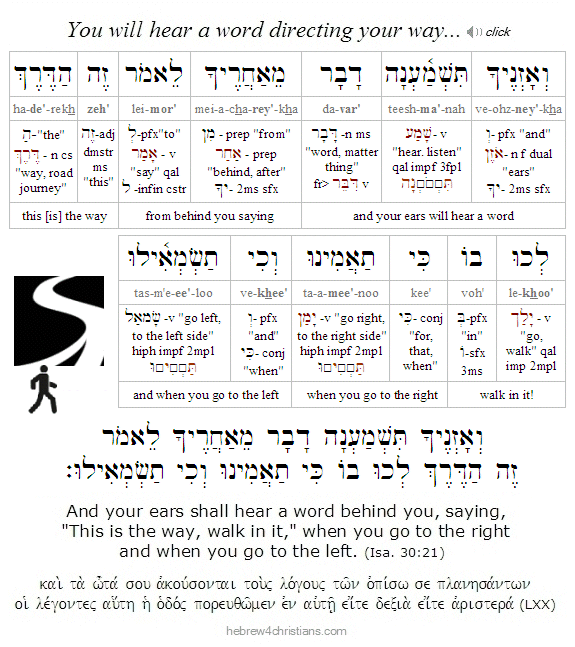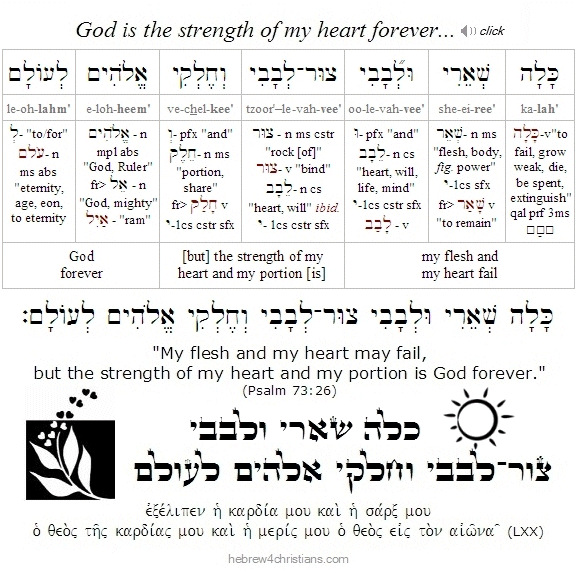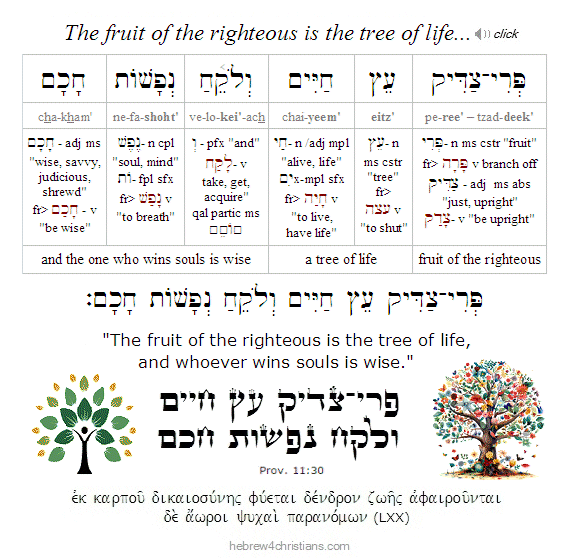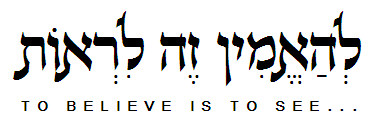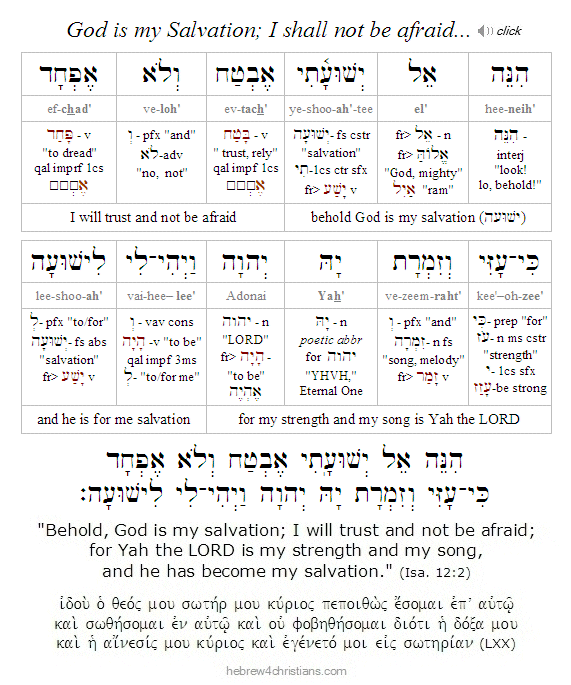|
February 2025 Updates (continued)
Note: If any page content appears to be missing, please refresh the page...
True Transformation...

02.07.25 (Shevat 9, 5785) The Scriptures call us to be transformed (μεταμορφόω) by "renewing our minds" (Rom. 12:2), though how we are to do this remains an open question. Our perspectives and attitudes are shaped by our assumptions about life, many of which are "preconscious" or hidden from our awareness. Habitual thoughts, biases, prejudices, fears, etc., all affect (and distort) the way we see and understand reality. In light of this, how can we change? How do we develop right thinking power? How can we apply our minds to perceive the good, instead of responding in unreflective and negative ways to our circumstances? How do we discipline our wills so that "if there is anything worthy of praise" we are to think about these things (Phil. 4:8)?
Surely we cannot transform ourselves, for we are the source of our own impairment; we are the patient who needs the cure.... Healing therefore comes from a power greater than ourselves, that is, by receiving the light of God's truth, becoming "single-minded," with our eyes focused on what is real. "If your eye is "single" (i.e., ἁπλοῦς, sincere, focused)," Yeshua said, "your whole body will be filled with light" (Matt. 6:22). We thereby "renew" (ἀνακαινόω) our minds, turning away from the darkness, despair, and unsound reasoning of this world by focusing on the glory and goodness of the Lord our God.
Likewise the Torah commands: "You shall be made whole (i.e., tamin: תָּמִים) with the LORD your God" (Deut. 18:13). We are made "whole" or "perfect" (i.e., complete) when we resolutely turn to God for healing of our inner dividedness, as it says: "The Torah of the LORD is perfect (תָּמִים), returning the soul" (Psalm 19:8). And where it is written, "Let us hear end of the matter: Fear God and love his commandments, the text adds: ki zeh kol-ha'adam (כִּי־זֶה כָּל־הָאָדָם), "for this is the whole man," suggesting that those who return will be healed of their double-mindedness (Eccl. 12:13). Ultimately we are made whole when we are united to God in Messiah, for then we are "with the LORD our God" and the Spirit of the LORD writes Torah within the heart of faith (Jer. 31:33).
Hebrew Lesson
Psalm 19:7 Hebrew reading (click):
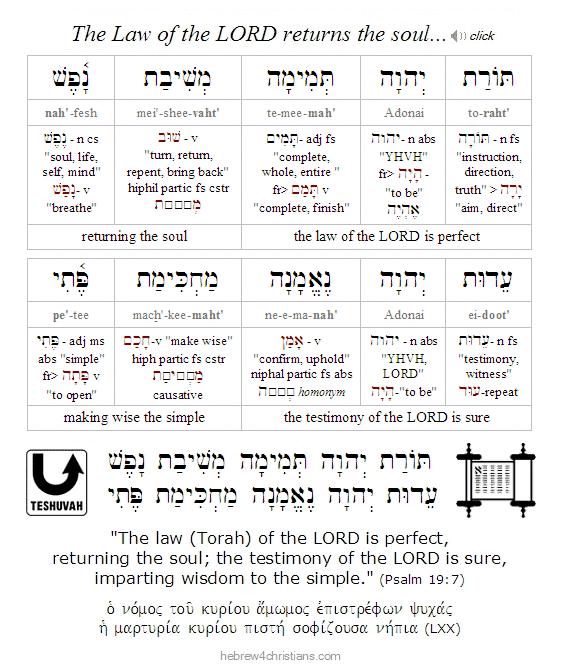 |
Bitterness for Shalom...
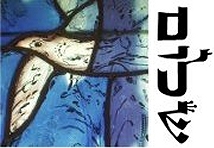
02.06.25 (Shevat 8, 5785) From our Torah portion this week (i.e., parashat Beshalach) we read that when the Israelites came to a place called Marah, "they could not drink the water because it was bitter" (Exod. 15:23). Note that the Hebrew text allows us to read that it was the Israelites themselves who were bitter – ki marim hem (כִּי מָרִים הֵם) – "for they (i.e., the Israelites) were bitter," and their bitterness made the water seem so as well....
After the people complained, God showed Moses a tree and threw it into the water, making it drinkable. Interestingly the Hebrew text literally reads, "the LORD taught him a tree" (וַיּוֹרֵהוּ יְהוָה עֵץ), suggesting elon moreh (אֵלוֹן מוֹרֶה), the "teaching tree of Abraham" (Gen. 12:6). The sages say this tree symbolized Torah, the tree of life (etz chaim), which brings happiness to those who take hold of it (Prov. 3:18), though we see Yeshua, the fallen tree that yields mayim chayim - living water - to revive the hearts of mankind...
Hebrew Lesson
Isaiah 38:17 reading (click):
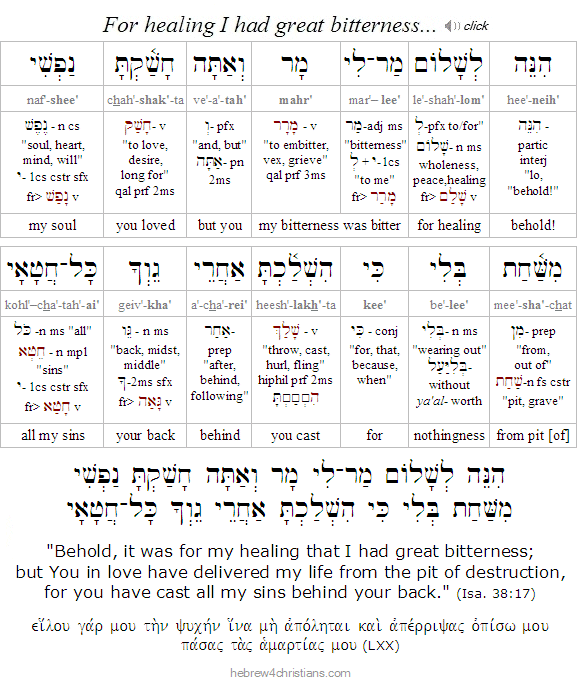 |
Love Story of Exodus...

02.06.25 (Shevat 8, 5785) The story of the Exodus from Egypt can be read as a great "Cinderella-like" love story. The beloved is imprisoned in far away castle, made to do the lowliest of labor, but the Lover soon appears and heroically rescues her from her distress. Together they run away to a land of promise, but they must traverse dangerous desert places, where the Lover protects and cares for his beloved. Eventually they pledge their undying love for one another and their married life begins...
Or so goes the story... But practically speaking, how would God - the Creator and LORD of all - "woo" a nation? What would such a courtship be like? How would the betrothed come to understand the Heavenly Bridegroom? For that matter, how would the betrothed come to understand herself?
Recall that after the LORD split the sea and led his people safely across, Israel sang a song of praise to Him. In Jewish tradition this is called Shirat Hayam, "the Song of the Sea," which is an "antiphon," or song of response to their deliverance from Egypt. In the Torah we read "Then Moses and the children of Israel sang this song to the LORD, and spoke, saying: "I will sing to the LORD, For He has triumphed gloriously! The horse and its rider He has thrown into the sea! The LORD is my strength and my song, and he has become my salvation; this is my God, and I will praise him, my father's God, and I will exalt him..." "Who is like you, O LORD, among the gods? Who is like you, majestic in holiness, awesome in glorious deeds, doing wonders? ... You have led in your steadfast love the people whom you have redeemed; you have guided them by your strength to your holy abode... You will bring them in and plant them on your own mountain, the place, O LORD, which you have made for your abode, the sanctuary, O Lord, which your hands have established" (see Exod. 15:1-21).
Note that the opening statement, "Then Moses and the children of Israel sang" is actually in the future tense: "Then they will sing" (אָז יָשִׁיר־מֹשֶׁה וּבְנֵי יִשְׂרָאֵל) which the sages say refers to the coming of Messiah. Indeed, in Revelation 15:3 we read that this song of Moses, as well as the song of the Lamb of God, will be sung in heavenly places: "They sing the song of Moses (שׁירַת מֹשֶׁה), the servant of God, and the song of the Lamb (שִׁירַת הַשֶּׂה), saying: "Great and marvelous are Your works, Lord God Almighty (יהוה אֱלֹהֵי צְבָאוֹת)! Just and true are Your ways, O King over the nations (מֶלֶךְ הַגּוֹיִם)" Note also that in the closing phrase of Shirat Hayam we read: יְהוָה יִמְלֹךְ לְעֹלָם וָעֶד - "the LORD will reign forever" (Exod. 15:18), but the word "will reign" (יִמְלךְ) is spelled with a missing letter Vav (ו), which suggests the Messiah our King Yeshua. The LORD will indeed reign when the rightful heir to the throne of David and the true King of Israel soon appears....
Going back to the "love story" analogy, at this point in their relationship, the betrothed knew the Divine Bridegroom in terms of His heroic deliverance and power, and even held hope of being led to His "holy abode" to dwell with Him... But how well did she know Him? Would she willingly give herself to Him because she truly loved and trusted Him, or would she merely submit because she was overawed or obliged by His power and glory? How could she learn her own heart, and how could God show her who she was meant to be?
In a word - testing... When God delivered Israel from Egypt, He did not take them on the fast track to the Promised Land (though He certainly could have done so). No, there was a circuitous route to take, a divinely appointed wandering, a Divine Stroll of betrothal, if you will. In order to reveal Himself to the Israelites, God had to led them directly into the desert. He embittered waters to make them sweet once again; He let stomachs growl to provide the Bread of life; He parched mouths to give Living Water from the "Rock that was struck" (1 Cor. 10:4). God did all this to reveal to his newly redeemed people that He is the satisfaction of all their longings... He rescued his bride from the house of slavery and now wanted to refine her to receive greater revelation to come. He was "wooing" or "courting" her in order to bring her beneath a canopy of stars at Sinai...
Hebrew Lesson
Song 6:3 Hebrew reading (click):
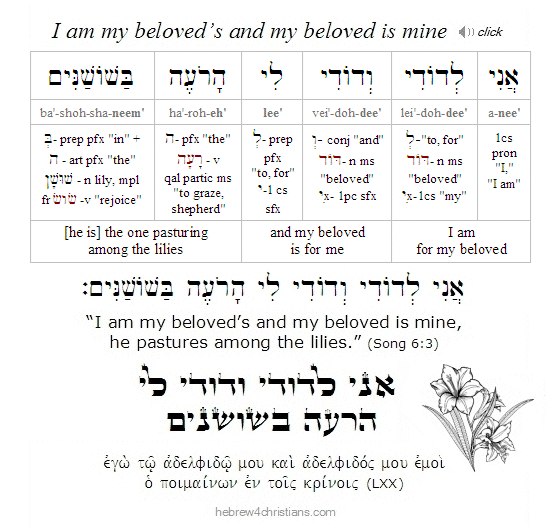 |
The Word of Guidance...
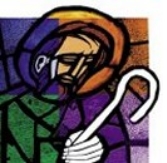
02.06.25 (Shevat 8, 5785) In our Torah portion for this week (i.e., Beshalach) we learn that the LORD chose to take his redeemed people along the "longer road" to the promised land, just as we find ourselves still awaiting the completion of our redemption in the world to come. And like the Israelites, we must be on guard, since when things get difficult, our tendency is to go back to what is familiar, even if it is painful. Thank God our Good Shepherd Yeshua teaches us and guides us in the way to go: "And though the Lord give you the bread of adversity and the water of affliction, yet your Teacher (מוֹרֶה) will not hide himself anymore, but your eyes shall see your Teacher. Your ears will hear a word behind you, saying: 'This is the way; walk in it,' when you turn to the right or to the left" (Isa. 30:20-21).
וְאָזְנֶיךָ תִּשְׁמַעְנָה דָבָר מֵאַחֲרֶיךָ לֵאמר
זֶה הַדֶּרֶךְ לְכוּ בוֹ
כִּי תַאֲמִינוּ וְכִי תַשְׂמְאִילוּ

"Your ears will hear a word behind you saying:
'This is the way; walk in it,'
when you turn to the right or to the left."
(Isa. 30:21)

Hebrew Lesson
Isaiah 30:21 reading (click):
What a beautiful image of our LORD as our Teacher and Good Shepherd, who guides us in the paths of life and delivers us from "right-hand and left-hand errors." And may God keep us upon the path of his righteousness, free from the seductions of the tempter who wants to distract our souls and lead us into fruitless byways and trouble. May we receive grace to behold His face, even in the midst of adversity or affliction, learning from Him the way to go...
"Come, my people, enter your chambers, and shut your doors behind you" (Isa. 26:20). The LORD beckons: "Call to me and I will answer you, and will tell you great and hidden things that you have not known" (Jer. 33:3). And I looked, and behold, a door standing open in heaven. And the first voice, which I had heard speaking to me like a trumpet, said, "Come up here, and I will show you what must take place" (Rev 4:1).
The Test of Manna...
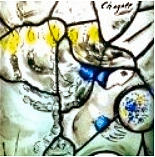
The following is related to this week's Torah reading, parashat Beshalach...
02.06.25 (Shevat 8, 5785) Exactly one month after the Exodus (i.e., Iyyar 15), the LORD led the Israelites from the oasis and palm trees at Elim (אֵילִם) into the deeper part of the desert, to midbar Sin (מִדְבַּר־סִין), a desolate region that was about midway to Sinai going southeast (Exod. 16:1). About this time, the food provisions the people had brought with them ran out, and the Israelites began grumbling against Moses and Aaron, saying: "If only we had died by the hand of God in the land of Egypt, when we sat by the pots of meat (סִיר הַבָּשָׂר), when we ate bread to our fill, for you have brought us out into this desert to starve to death!" (Exod. 16:3). The LORD then said to Moses, "'Behold, I am going to rain down bread from heaven (לֶחֶם מִן־הַשָּׁמָיִם) for you. The people will go out and gather a portion for that day so that I might test whether they will walk in my Torah (תּוֹרָה) or not" (Exod. 16:4).
Note that while God graciously provided the miracle of manna, the people were required to receive it for themselves. Note further that a portion was given for just that day, and storing it up for later use (except for the Sabbath) resulted in rottenness and decay (Exod. 16:20). By being required to collect their daily bread (דְּבַר־יוֹם בְּיוֹמוֹ) the people learned that God's blessing and their efforts worked together. Our sustenance is a gift from heaven, though we must reach out to take hold of it... The sages here note that the Sabbath and the manna both underscore our complete dependency on God as the source of our sustenance. We will see this again regarding agricultural laws of Shemmitah (שְׁמִטָּה) and the Jubilee (יובל).
"I will test them (אֲנַסֶּנּוּ) whether they will walk in my Torah (הֲיֵלֵךְ בְּתוֹרָתִי) or not" (Exod. 16:4). This is the test (נִסָיוֹן) to see whether we will trust God to meet our needs (whether they are physical needs or spiritual). After all, it is one thing to believe God can help you and yet another to trust that He will actually do so. Peace comes when belief and trust are unified within the heart - when the one who firmly believes completely trusts as well. God gave bread from heaven to test us: "And he humbled you and let you hunger and fed you with manna, which you did not know, nor did your fathers know, that he might make you know that man does not live by bread alone, but man lives by every word that comes from the mouth of the LORD" (Deut. 8:3). God humbles us, which is really one of the greatest of blessings, since we then learn to rely on God's strength and love to meet all our needs.
For more about this topic, see the article "Bread from Heaven."
Hebrew Lesson
Deut. 8:3b Hebrew reading:
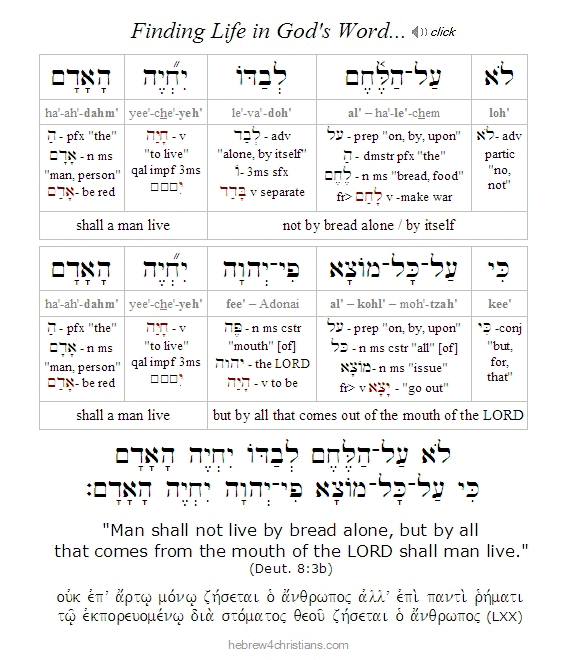 |
Suffering and Faith...
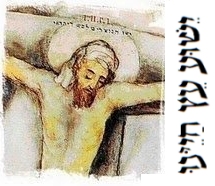
"For we will surely die and become like water spilled on the ground, which cannot be gathered up again. Yet God does not take away a life but he devises means so that his banished ones are not expelled from him." - 2 Sam. 14:14
02.05.25 (Shevat 7, 5785) Shalom dear chaverim. Though we rejoice that God is faithful and has saved us from spiritual death, we nevertheless sometimes suffer, hurt, and ache in this life. And all of us - believer and unbeliever alike - will physically die.
In light of this, and based on the testimony of the holy Scriptures, it is nothing less than false teaching to make the spurious claim that God never wants his children to be sick and will always reward his faithful children with health and prosperity.... Indeed, this is not only false teaching based on a superficial reading of Scripture, but it is a cruel teaching too.
Think of Joni Erickson Tada, for instance, or countless other saints who suffered and died without being healed in earthly terms. Think of God's revelation to Job or to Elijah or to John the Baptist... Remember how the Apostle Paul had repeatedly asked God to take away his affliction but was denied. Think of the martyrs through the ages who suffered and died unjustly at the hands of the wicked, and especially think of our Lord Yeshua Himself who suffered throughout his life and finally gave himself up in great agony upon the cross. "It pleased the LORD to crush Him and put him to grief" (Isa. 53:10).
To teach that all believers of Yeshua should be in perfect health or "trouble free" in this life casts a shadow of doubt over their soul when they inevitably will get sick or when they face their death, which is the "greatest sickness" after all... God heals us, absolutely, but his healing gives us life from above, delivering us from spiritual death, not from physical death in this fallen world.
Death has lost its "sting" in the sense of being the final word about life, and God Himself has "swallowed up" death through the victory of Yeshua on our behalf as the "Second Adam" and head of redeemed humanity. But why do we still get sick and die? Our death does not pay the debt for our sins which was paid in full by Yeshua. Rather it brings an end to our sinning and ushers us into the divine presence and eternal life.
The Apostle Paul suffered and later was martyred for his faith. He wrote to encourage us to persevere in faith, despite the hardships we face in this world. He wrote: "Our light and momentary troubles are achieving for us an eternal glory that far outweighs them all. So we fix our eyes not on what is seen, but on what is unseen, since what is seen is temporary, but what is unseen is eternal. For we know that when this earthly tent we live in is taken down (that is, when we die and leave this earthly body), we will have a house in heaven, made for us by God himself and not by human hands." (2 Cor. 4:17-5:1).
And though Paul wanted to escape the sufferings of this life to be with God, he nevertheless affirmed: "I count everything as loss because of the surpassing worth of knowing Christ Jesus my Lord. For his sake I have suffered the loss of all things and count them as rubbish, in order that I may gain Christ and be found in him, not having a righteousness of my own that comes from the law, but that which comes through faith in Christ, the righteousness from God that depends on faith – that I may know him and the power of his resurrection, and may share his sufferings, becoming like him in his death, that by any means possible I may attain the resurrection of the dead" (Phil. 3:7-11). Paul said that the loss of all that he once esteemed -- his heritage, health, and so on - was "rubbish" compared to being identified with Yeshua, sharing in his sufferings, even becoming like him in his death, so that he would know the power of the resurrection from the dead...
Yet Paul also longed to be set free from this realm and to be with the Lord, to come home and experience the fullness of salvation. He had run hard and fought the good fight of faith, yet he was inwardly torn, wanting both to be with the Lord yet to remain to encourage others... "I am hard pressed between the two. My desire is to die and be with Yeshua, for that is far better, but to remain in the flesh is more needful for you" (Phil. 1:23-24).
"God works all things together for our good," and that includes the sufferings and losses of life. How could it be otherwise? The LORD has complete authority over death and darkness (Isa. 45:7); He is the keyholder of hell and death (Rev. 1:18). He ordains our days establishes our steps. "Who gave a mouth to man, or who makes a person mute or deaf or seeing or blind? Is it not I, the LORD?" (Exod. 4:11).
Does not God speak out of the midst of the whirlwind? Did not his darkness surround the cross when Yeshua groaned in agony for our deliverance? We are in God's school of life and the aim is our education for eternity. "A righteous person may have many troubles, but the Lord delivers him from them all." That is part of the lesson plan for us, to go through troubles in order to experience God's deliverance and blessing (Acts 14:22).
Of course a whole lot more could be said about this topic, but it is evident and clear enough that God, in his wisdom and grace, allows suffering and troubles into our lives for our good and for his glory. We may not be able to fathom the reasons for why those who trust in God suffer, but we accept that suffering is bound up with God's plan for the healing and redemption of all things. He shall wipe away all our tears, but we have tears that will be wiped away...
"Blessed be the God and Father of our Lord Yeshua the Savior, the Father of mercies and the God of all comfort (אַב הָרַחֲמִים וֵאלֹהֵי כָּל נֶחָמָה), who comforts us in all our tribulation, that we may be able to comfort those who are in any trouble, with the comfort with which we ourselves are comforted by God" (2 Cor. 1:3-4).
Find peace in the struggle; the One who began a good work in you will bring it to completion in Yeshua. "Now unto Him who is able to keep you from falling, and to present you faultless before the presence of his glory with exceeding joy, to God our Savior, who alone is wise, be glory and majesty, dominion and power, both now and ever. Amen." (Jude 1:24-25).
Hebrew Lesson
Psalm 73:26 reading (click):
Hidden Life of the Seed...
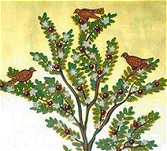
"Rejoice, because your names are written in heaven." - Luke 10:20
02.05.25 (Shevat 7, 5785) A seed is small, fragile, and seemingly insignificant, yet in the hands of a wise gardener it is understood to be miraculous, able to be perfected and made fruitful. You may feel unworthy, helpless, and forlorn, but you are regarded as blameless and upright because of the miracle of God's life imparted within you, that is, the "holy seed" implanted at your regeneration (see 1 Pet. 1:23). You have a new nature that draws life from heaven as God's own child. And just as a master gardener carefully tends to his planted seeds, so God will tend the divine life sown within your heart. The seed is "hidden" in the soil, unseen by others, yet tended by the gardener who knows its potential to be perfected.
The seed "contains" the essence of the life it replicates. Inside the seed there is an embryo (the baby plant), and when the seed begins to grow, one part of the embryo becomes the (visible) plant while the other part becomes the (hidden) root of the plant. However, the outer shell of the seed must first be broken, and then what appears is the "radicle," or the embryonic root which will develop into a plant. The life cycle of a seed is one of burial and resurrection, of growth and fruitfulness (John 12:24), and the divine life implanted within our hearts will bear fruit: "For by his sacrifice, Yeshua has perfected (i.e., made complete, whole, full of life) all those who are being sanctified" (Heb. 10:14).
Yeshua said, "Be perfect even as your Heavenly Father is perfect" (Matt. 5:48), which of course is an impossibility from a human point of view, but is a corollary of the divine nature implanted within you... The seed within you is perfected to be God's beloved child. You might miss it in the midst of your everyday struggles with fear and the "miasma" of this depraved world, but God is working in you both to will and to do his good pleasure (Phil. 2:12). Like all matters of the Spirit, God's perfection in you comes by faith, not by sight... Only the new heart (lev chadash) created by power of God's Spirit can possibly yield the fruit of the Spirit.
Therefore take heart and do not yield to despair over the mess of your lives. Remember that fruit does not immediately crop up but requires time and its own season... The process of spiritual growth is ultimately mysterious and divine: "The Kingdom of God is like someone who spreads seed on the ground. He goes to sleep and gets up, night and day, and the seed sprouts and grows, though he does not know how. By itself (αὐτομάτη, "automatically") the soil produces a crop, first the stalk, then the head, then the full grain in the head. And when the grain is ripe, he comes in with his sickle because the harvest has come" (Mark 4:26-29).
Trust in God's power to do the miracle. "Now may the God of peace who brought up our Lord Yeshua from the dead, that great Shepherd of the sheep, through the blood of the everlasting covenant, make you perfect in every good work to do His will, working in you that which is well pleasing in His sight, through Yeshua the Messiah, to whom be glory forever and ever. Amen" (Heb. 13:20-21). Amen. " He who calls you is faithful; he will surely do it" (1 Thess. 5:24).
Hebrew Lesson
Proverbs 11:30 Hebrew reading (click):
Faith and Woundedness...
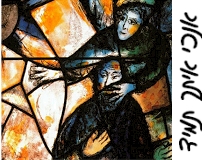
I've been suffering a lot lately due to some health issues, trusting God through it all...
02.04.25 (Shevat 6, 5785) Affliction can sometimes feel like torture, being abandoned by God, misunderstood by others, and disgusted with ourselves. The language of pain is intensely personal and often inexpressible. Ongoing affliction tempts us to blame ourselves, to lose sight of God, and to feel hopeless. It is a real struggle.
The French philosopher Simone Weil suffered personal affliction her whole life but connected it to the deeper message of the gospel. She learned that the walk of faith was not so much a search for a supernatural remedy from suffering but a supernatural use for it. She grew to accept and to endure her afflictions, and by steadfastness of heart to overcome the power of suffering, even though it haunted her daily life. She regarded suffering as the high calling to love and trust God despite her pain; she learned that "when I am weak, then am I strong."
The challenge of ongoing affliction is to simultaneously affirm God's presence and love in the midst of the "dark cloud of unknowing." Faith is the struggle to trust that God indeed works all things - including our ongoing afflictions - together for our good. Faith discovers God's grace is always sufficient for us, even in our weaknesses.
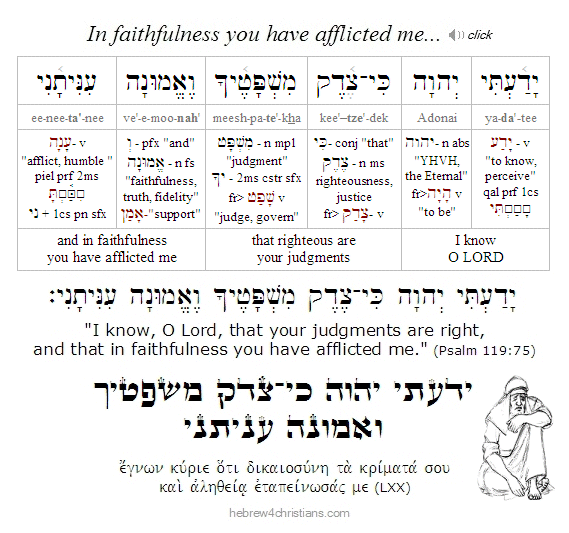 |
It is written: "Faithful are the wounds of a friend; but the kisses of an enemy are deceitful" (Prov 27:6). Our LORD is a friend and lover (oheiv) who, though He may allow us to be wounded, nevertheless "sticks closer than a brother" - yesh oheiv daveik mei'ach: יֵשׁ אֹהֵב דָּבֵק מֵאָח (Prov 18:24). His afflictions are always purposive and ultimately healing.
The aim of affliction is to ground us in the truth, namely, that we are not God, and that we must surrender ourselves to God's care, even in the wastelands and desperate moments of our lives. When we cling to this world, this life, and seek to make it of value apart from Him, we are living in a state of delusion and blindness. When we are humbled by God's loving affliction, we are set free from the futility of seeking to control the world, and are thereby made free indeed.
For those whom God has chosen, the fires of affliction are purifying fires, refining fires, intended to separate the precious from the dross. We glorify God in the fire when we can say, "Here I am, LORD, do with me as it seems good in thy sight, for I know I shall not have one stroke but thou will give me grace to bear under it." Amen.
Deliver us from Evil...
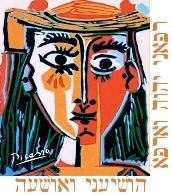
"God is present in the moment of choice, not in order to watch but to be chosen. Therefore, each person must choose. Terrible is the battle, in a person's innermost being, between God and the world. The crowning risk involved lies in the possession of choice."- Soren Kierkegaard
02.04.25 (Shevat 6, 5785) There is the great danger of squandering our lives through fear, vanity, and worldly concerns... Be grateful, then, for afflictions that bring us pause and move us inward. Examine yourself; consider what really moves you. Be careful not to deceive yourself by "reasoning around the truth" (i.e., παρα + λογίζομαι), as James the Righteous puts it (James 1:22). Many people fool themselves by assuming they know or understand what is good, but they confine this ideal to a matter of opinion rather than experiencing it as a matter of the will (or they confuse their opinion of the ideal with what is real).
There is something worse than death that should concern all people, however, and that is discovering that, upon your death, you had missed what is most important, that you sold your soul for vanities, and that you never learned the true reason for your existence...
Some of the ancient Greek philosophers assumed that moral evil was the result of ignorance, and they thought that truly knowing what was good would lead to doing the good. For example Socrates states (in the Protagoras) that no one knowingly does the wrong thing, and therefore all evil is the result of ignorance (or being fooled into choosing choosing an illusory good). He argued this way because he assumed that doing wrong harms the soul, and since no one willingly acts against his own interests, wrongdoing must be result of ignorance. This somewhat optimistic view implies that the answer to the problem of moral evil is "education," or leading people out of the dark cave of their lower nature to experience the light of reason. If we just really knew why doing this or that sinful thing hurts us, we would change our ways and repent, or so the theory goes... Alas, human experience proves that such "head knowledge" often does not change the way we choose, and we all know people who have habits they realize are harmful but continue to indulge in them anyway.
There may be some truth to the idea that evil is a matter of ignorance however, since ignoring what is good, being indifferent, apathetic, and cynical is a defect of character (ἀκρασία), and learning to be honest, upright, courageous, unselfish, and so on, requires personal struggle to make the "ought" of moral reality an expression of the "is" of inner life. What is often most shocking about moral evil is that it expresses apathy or indifference toward the objections of conscience. Moral evil is essentially heartless and devoid of empathy, a state of cold-heartedness and callousness for the feelings and dignity of others.
According to the Jewish philosopher Hannah Arendt, the lack of moral thought and reflection creates what she called the "banality of evil," that is, the unthinking acceptance of evil so that it is no longer regarded as outrageous or strange. People deaden their conscience by refusing to honestly engage questions such as: "What is goodness?" "Is evil real?" "Do we have an obligation to observe moral truth?" "What is the good life?" "How should we live?" "Do our actions really matter?" "Will God judge my life?" and so on.
On the other hand, our culture has been so shocked and made numb by the ongoing practice of lawlessness wickedness that people have lost their sense of shame. We are no longer outraged when we hear of the latest crimes or abuses of power in our postmodern world.... We must be careful, however, not to become evil by despising what is evil. For instance, we may feel so outraged and threatened by the evil actions of others that we deny their humanity, thereby becoming the very thing we hate.
King David exclaimed: "Who can understand his errors? cleanse thou me from secret faults" (Psalm 19:12). Yea, "the heart is deceitful above all things and desperately sick; who can understand it?" (Jer. 17:9). "Oh there is nothing as deceitful and as cunning as a human heart, resourceful in seeking escapes and finding excuses; and there surely is nothing as difficult and as rare as genuine honesty before God." (Kierkegaard: Discourses). Therefore we pray: "Heal me, O LORD, and I shall be healed; save me, and I shall be saved. Be not a terror to me; you are my refuge in the day of evil" (Jer. 17:14, 17).
Hebrew Lesson
Jeremiah 17:14 reading (click):
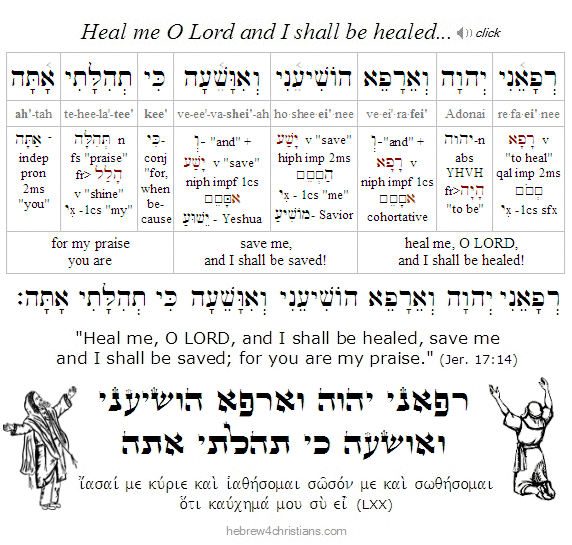 |
Believing and Seeing...
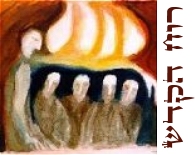
02.03.25 (Shevat 5, 5785) This week's Torah portion (i.e., parashat Beshalach) contains some of the most dramatic episodes recorded in all of the Scriptures. Here we read about the great exodus of the Israelites on the day of Passover and Pharaoh's last-ditch pursuit of the Hebrew slaves. We read how the Shekhinah Glory held back Pharaoh's army, how the LORD split the Sea of Reeds so that the Israelites could safely pass through the waters, and how Pharaoh's forces were all drowned in the sea. We further read how God personally led the Israelites into the desert and sustained them by transforming "bitter water" into sweet water, sending manna from heaven, and providing a miraculous water source from the rock that Moses struck. Yet despite all the miracles and wonders performed on behalf of the Israelites, the people inexplicably seemed to "forget" about their miraculous redemption. Indeed, it was just a few days after the awe-inspiring deliverance from Egypt that the people began to murmur, complain, and kvetch. The sorry state of the Israelites was so bad that the Midrash Rabbah plaintively wonders how it was possible that the Israelites could have so quickly forgotten all of God's miracles performed on their behalf (Psalm 78:41-56).
The story of the disgruntled Israelites teaches us that miracles are never enough to sustain our faith. Seeing isn't believing, but rather the other way around.... This explains why those church groups that emphasize "signs and wonders" often contain so many exhausted people. Miracles are insufficient for faith; people get excited about them while they occur, but they soon forget them and return to a state of desperation and despair. Necessarily the cycle must repeat itself, with ever-increasing claims of the miraculous, in order to keep the illusion alive.... In light of this, it is wise to consider that the passion for "signs and wonders" may be little more than a counterfeit of the real need to surrender and serve God. After all, truly loving the LORD with all your heart, with all your soul, and with all your strength is the goal of faith. A genuine heart of faith, then, is a miracle of a greater kind than that of splitting the Sea of Reeds.
Regarding the case of the redeemed Israelites, what has struck some commentators is not so much the incredible signs and wonders that the LORD performed on behalf of Israel, but rather the people's persistent inability or unwillingness to believe... Some of the Jewish sages have gone so far as to say that the entire Bible may be read as a book about God's apparent inability to teach the Jewish people how to be grateful. The same certainly can be said about many professing Christians today.
Lasting transformation of the heart comes from "following" the LORD God of Israel. As I've mentioned elsewhere, disciples of Yeshua are called talmidim (תַּלְמִידִים) -- a word that comes from lamad (לָמַד) meaning "to learn" (the Hebrew word for teacher is melamad (מְלַמֵּד) from the same root). In the Greek New Testament, the word for "disciple" is μαθητής (the word "math" comes from this), that is, a pupil of a διδάσκαλος, or a teacher. In other words, disciples of Yeshua are automatically "enrolled" in the school of truth, which is also a "school of suffering" (Col. 1:24). In the Torah the "daily sacrifice," or korban tamid (קָרְבַּן תָּמִיד), was offered to the LORD every morning and evening upon the altar, which corresponds to being a "living sacrifice" (i.e., korban chai: קָרְבָּן חַי) to the LORD (Rom. 12:1-2). We must take up our cross daily (Luke 9:23). Yeshua plainly said: "For this purpose I was born and for this purpose I have come into the world -- to bear witness to the truth. All who are of the truth listen to my voice" (John 18:37). It is hard to imagine a follower of Yeshua who does not love, study, and value the truth...
ראשׁית חכמה קנה חכמה
ובכל־קנינך קנה בינה
rei·sheet · chokh·mah · ke·neih · chokh·mah
oo·ve·khol-keen·yah'·ne·kha · ke·neih · vee·nah

"The first matter of wisdom is this: Get wisdom!
and in all your get, acquire understanding." (Prov. 4:7)
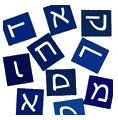
Hebrew Lesson
Proverbs 4:7 Hebrew reading (click):
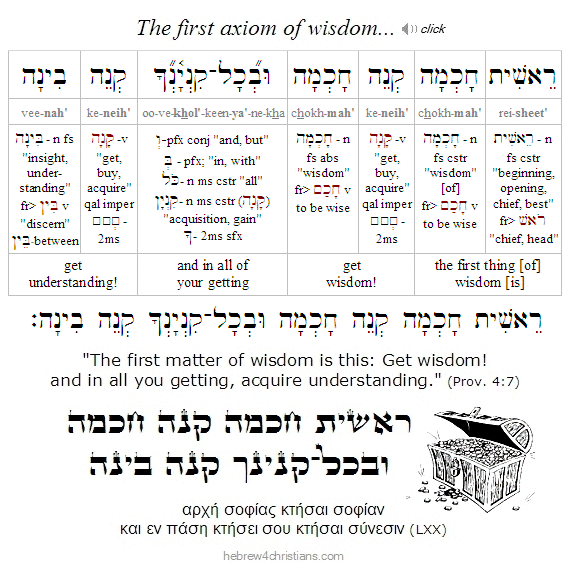 |
The Hebrew word for education is chinukh (חִנּוּךְ), a word that shares the same root as the word for "dedication" (i.e., chanukah: חֲנֻכָּה). True education of the Scriptures is therefore foundational to being a student of the Messiah. We are called to "rightly divide" (ὀρθοτομέω, lit. "cut straight") the "word of truth (2 Tim. 2:15). Among other things, then, following Yeshua means becoming a student of the Jewish Scriptures that He loved and fulfilled (Matt. 5:17-18; Luke 24:44-45). Only after learning from Yeshua as your Teacher will you be equipped to "go to all the nations and teach" others (Matt. 28:19). This is accomplished not merely by explaining (propositional) doctrine but by kiddush HaShem -- sanctifying the LORD in our lives (1 Pet. 1:15-16). As the sages noted long ago: "Upon three things the world does stand: upon the Torah (truth), upon worship, and upon acts of lovingkindness" (Avot 1:2). We are a "living letter" sent to the world to be "read" (2 Cor. 3:2-3).
It has been said that it was easier for the LORD to get Israel out of Egypt than it was for Him to get Egypt out of Israel... The LORD knew the process would be an arduous one, requiring 40 long years of study in the desert under the instruction of Moses, and yet despite all this the people "were unable to enter because of unbelief" (Heb. 3:19; 4:11; Psalm 95:7-11). This is a truly sobering warning, and we are encouraged to open our hearts to the miracle of God's love for us. "Today, if you hear His voice, do not harden your hearts." May it please God to help us make a new commitment to study and to live the truth of the Torah and Scriptures for the glory of His Name. Amen.
 |
Stepping out in Faith...

The divine consequence of the exodus from Egypt (יציאת מצרים) is still felt to this day, as indeed is the greater exodus Yeshua attained by the power of the cross (Luke 9:30-31).
02.03.25 (Shevat 5, 5785) From our Torah this week (i.e., Beshalach) we read how the children of Israel were trapped before the sea with no way of escape... Moses then cried out to God who told him to march forward -- right into the waters -- as the Pillar of Cloud settled between the people and Pharaoh's advancing army.
According to midrash, when Moses lifted his staff to divide the sea, at first nothing happened. The people waited anxiously at the seashore, wondering what to do. Finally, Nachshon ben Aminadav, a descendant of Judah (Num. 1:7), waded into the water "up to his nose," and the winds then began blowing to divide the waters (Shemot Rabbah). The great miracle of kiryat yam suf (קרית ים סוף)- the splitting of the Sea of Reeds (the word "suf" means "reed,"see Exod. 2:3) therefore happened because someone found courage and took a step of faith: "And the people of Israel went into the midst of the sea on dry ground, the waters being a wall (חוֹמָה) to them on their right hand and on their left" (Exod. 14:22). They marched across the sea all night (i.e., Nisan 21), under the light of the Shekhinah Glory...
The Talmud says "kasheh le'zavgom ke'kriat yam suf," which means it is more difficult for God to create a marriage than to split the sea. They reason this way because each person needs to take individual action to trust the other. Likewise with God. It is more difficult for God to get us to be in a trusting relationship with Him than it is for Him to split a sea. Of course the problem is not with God, who is the perfect "husband," but with our adulterous inner nature. It took the LORD a year to deliver Israel from Egypt, but it took Him 40 years to teach Israel to trust in His promises of love. God always awaits our teshuvah - our "answer" - to His invitation before He reveals more to us. As Yeshua once said to his followers, "I still have many things to say to you, but you cannot bear them now" (John 16:12). Some things about God can only be known by stepping out in faith and surrendering ourselves to Him.
Hebrew Lesson
Psalm 37:5 Hebrew reading (click):
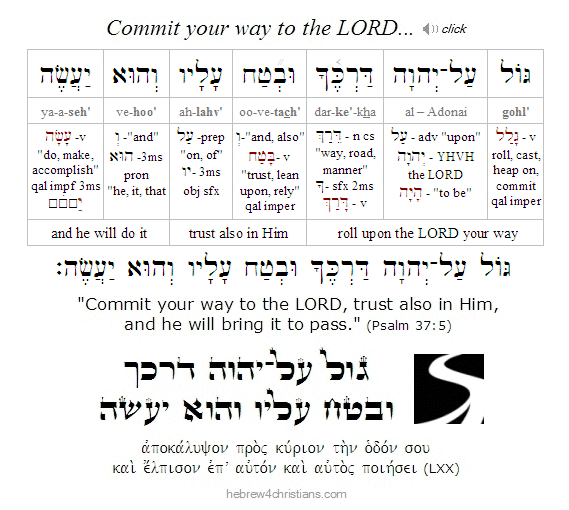 |
Note: For more on this subject, see "Stepping out in Faith..."
Finding the Place of God...
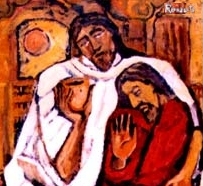
02.03.25 (Shevat 5, 5785) What was it about Yeshua that made him so special? For the moment, put aside your theology or "Christology" and ask what made him so attractive and endearing to people on a human level. What sort of a man was he? What made people want to follow him? Did he have special "charisma" or an aura about him?
We really don't know the answer to these questions, of course, since the New Testament says little about his physical appearance, though the prophet Isaiah foretold that he would be a man of "no reputation," with no regal form or "comeliness" with which we would desire him. Indeed, he would be "despised and rejected of men, a man of sorrows, and acquainted with grief" (Isa. 53:2-3). Indeed Yeshua was born into this world in obscurity, grew to become an unassuming man, a "nobody" in the eyes of the world, without power or political authority. For all the more reason then does this suggest that what made him so attractive was his heart, his kindness, and his accessibility, and that's part of the lesson we learn by the invitation he gave to the two disciples of John the Baptist to come to his home.
Recall that the New Testament records how John the Baptist began announcing the imminent coming of the Messiah, calling the people to repentance. One day John saw Yeshua of Nazareth and proclaimed: "Behold the Lamb of God who takes away the sins of the world!" (John 1:29-30). Two of John's disciples (by tradition Andrew and John, author of the fourth gospel) were standing with him at the time and they believed John's testimony that Yeshua was the promised Savior of Israel. Indeed John had explained the purpose of his ministry was to herald the coming of Messiah, and his preaching was intended to prepare the people for the momentous hour. Therefore when John identified Yeshua as the "Lamb of God who takes away the sins of the world," they understood the implications and immediately decided to follow Yeshua as he walked away. When Yeshua turned to them and asked: "What are you looking for?" they replied, "Rabbi, where do you live?" And Yeshua then graciously invited them to "come and see." So they went to Yeshua's house and stayed with him for the rest of the day (see John 1:35-39). We may wonder, what did they see? What did they do? What did they discuss with Yeshua? We are not told, though it is clear Yeshua was a kind and approachable person, accessible to the seeking heart.
And this presents a sort of "parable" or pattern for anyone who would come to know Yeshua. First there is a deep awareness of the need to repent before God, as John the Baptist had preached, along with the realization that true repentance, or personal salvation, is impossible apart from divine intervention that would free the soul from its bondage to sin. Second there is revelation that points to Yeshua alone as our healer and deliverer. Third there is sincere desire to learn more about him and the nature of his character, and there is an "inner sense" that you are called to "come and see" where Yeshua lives...
This invitation is for all people who are burdened by their sins and who hunger and thirst for deliverance. Yeshua's message finds it place in the heart of the broken: "Come to me, all who labor and are heavy laden, and I will give you rest. Take my yoke upon you, and learn from me, for I am gentle and lowly in heart, and you will find rest for your souls. For my yoke is easy, and my burden is light" (Matt. 11:28-30).
It is your willingness to accept the invitation to know his heart that marks the first step from which all others may follow. Yeshua asks you to feel welcome and safe in his presence, as if you have belonged to him all along, to realize that you are accepted, respected, and dearly valuable to him. This is the "place" of God, the "where" of his presence and the "who" of his character. And indeed, God's Presence is liked to a "house," a "miskhan" or dwelling place, a refuge and sanctuary for the soul, a secret garden, a strong habitation, the everlasting arms of a loving Father, Abba, the one who makes a place for us, an everlasting domicile that will enshrine us in the comfort and blessing of eternal love.
Some people wrestle with shame and feel unworthy of love and blessing. It is hard for them to believe that God bears their sins because they do not believe they matter enough for God to do so. But God affirms and demands that we take his love seriously, that we esteem ourselves as people he loves and cares for despite our sins and failings... His heart extends to the "poor in spirit," to those who mourn over their lives, to the humble, the broken, the wandering outcast, the despised and rejected of men. Yeshua is the "friend of sinners" who calls out to their weariness: "Come to me, and I will give you rest..."
So what do you want? What do you truly desire of the Lord? Yeshua encourages us to come and see who he is and to repose in the place of his dwelling, the habitation of his heart. "Live in me - in the truth of my heart - and let my heart live in you" (John 15:4). This "house" of the Lord is found in heart connection with him, where you accept yourself as beloved in him. It is found in God's presence as Father, Son and Holy Spirit as we are made part of his family, members of his household, and partakers of the blessing of his love.
We start "following" the Lord by first trusting that he really desires us, for assuredly we will cannot do so unless we believe his heart for us, after all. We begin by praying, "Lord, how am I to be with you? How can my heart know your heart for me? How can I connect with you, finding life in your life? Is this not essential - to know who you really are, to experience your mercy and grace, to rest in your steadfast love and faithfulness? How can I experience your acceptance and kindness in light of my brokenness, shame and disappointment? Will you heal the wounds of my heart - wounds that you yourself bore for me in your suffering? I bow down in hope before the cries of my heart. I wait, O Lord, for your touch, the breath of your Spirit, the true balm of Gilead that forever heals my brokenness.
Recall the story about Elijah, dejected, weary, and feeling abandoned. The Lord instructed him, "Go out, and stand on the mountain before the LORD." And behold, the LORD passed by, and a great and strong wind tore into the mountains and broke the rocks in pieces before the LORD, but the LORD was not in the wind; and after the wind an earthquake, but the LORD was not in the earthquake; and after the earthquake a fire, but the LORD was not in the fire; and after the fire a still small voice... And, suddenly there came a Voice to him that asked, "What are you doing here?"
Or consider Job who was described as "a man blameless and upright, one who feared God and shunned evil" who nevertheless was tested and brought to despair and the knife's edge of death. After languishing in dismay, he found himself beneath the whirlwind, beholding the revelation of God's glory, and only afterward was he able to say, "I have heard of thee by the hearing of the ear (לְשֵׁמַע־אֹזֶן שְׁמַעְתִּיךָ): but now mine eye seeth thee (וְעַתָּה עֵינִי רָאָתְךָ). Therefore I forsake myself, and I repent in dust and ashes" (Job 42:5-6).
There is no recipe or formula for following the Lord since it involves turning to God from the depths of your soul, allowing him to be the center of your heart. In a sense it is a matter of losing yourself to find yourself, letting go of your fears and attachments in surrender to God. As we go through the refining fires, we leave behind the old life for the new - crossing over into the realm of the Spirit. Once we take hold of who we are in God's house, the despair that has haunted us fades away and we live in God's provision and abundance.
Faith in the truth of God's love sets us free, though we must be careful not to let our hope wane in quiet desperation. The temptation is to lose sight of God's heart for us or to be dissuaded from our hope because of sadness or fear. God is merciful and will beckon us to return to his love, though if we begin to fall away, he may lead us to confess once again that we are unable to control our lives, that we desperately need him, and to know once again that all that we are or ever shall be is bound up in his presence and love for us.
Yeshua is the answer to our hurting and desperate hearts. It may not be an "easy" answer, but it's the only answer that is real, with love forged in the passion of God's heart, the expense and expanse of which surpasses all of creation, forever and ever. Amen.
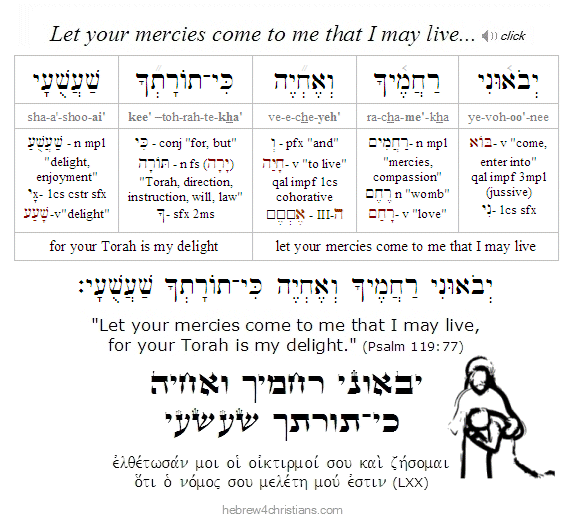 |
"Sabbath of the Song"
About Shabbat Shirah...
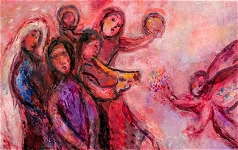
[ The following is related to this week's Torah reading, parashat Beshalach... ]
02.02.25 (Shevat 4, 5785) Our Torah reading for this week (Beshlach: Exod. 13:17-17:16) includes the famous Shirat Hayam (שִׁירַת הַיָּם), the "Song the Sea," a hymn of praise the Israelites sang to the LORD after they miraculously crossed the Sea of Reeds (i.e., Yam Suf: יָם סּוּף). Shirat Hayam is also traditionally sung on the 7th day of Passover (i.e., on Nisan 21) since it was first sung seven days after the people left Egypt during the time of the Exodus. When the Temple stood in Jerusalem, Shirat Hayam was sung every day by the Levites during the minchah (afternoon) offering. After the Temple was destroyed, however, the song was incorporated into the shacharit (morning) service of synagogues (i.e., "Mi Chamocha," etc.) to fulfill the Lord's commandment to "remember the day of your departure from the land of Egypt all the days of your life" (Deut. 16:3).
Today the Sabbath on which parashat Beshalach is recited is called Shabbat Shirah Hayam and the congregation rises when the song is chanted:
אָשִׁירָה לַיהוה כִּי־גָאה גָּאָה
סוּס וְרכְבוֹ רָמָה בַיָּם׃
עָזִּי וְזִמְרָת יָהּ וַיְהִי־לִי לִישׁוּעָה
זֶה אֵלִי וְאַנְוֵהוּ אֱלהֵי אָבִי וַאֲרמְמֶנְהוּ׃
יהוה אִישׁ מִלְחָמָה יהוה שְׁמוֹ׃
ah·shee'·rah · la-Adonai · kee-ga'·oh · ga'·ah
soos · ve·roh·khe·voh · rah·mah · ba·yahm.
oh·zee · ve·zeem·raht · Yah · va·hee-lee · lee·shoo·ah
zeh · ei·lee · ve·an·ve'·hoo · e·loh·hei · ah·vee · va·a·roh·me'·noo.
Adonai · eesh · meel·chah·mah · Adonai she·moh.

"I will sing to Adonai, for he has triumphed gloriously;
the horse and his rider he has thrown into the sea.
Yah is my strength and my song, and he has become my salvation;
this is my God, and I will enshrine Him, my father's God, and I will exalt him.
The LORD is a warrior; the LORD is his Name." (Exod. 15:1-3)
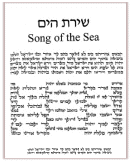
Download Study Card
To commemorate and honor this time, Jewish scribes (soferim) stylized the Hebrew text in a special way. The Talmud (Megillah 16b) states that Shirat Hayam must be written in the form of "a half brick over a whole brick, and a whole brick over a half brick," that is, with alternating half-lines, to resemble "building a house":
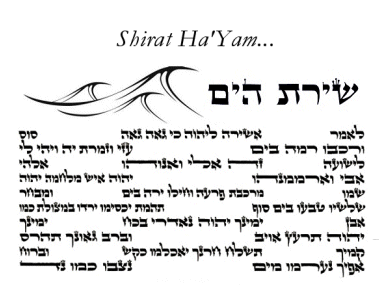 |
According to Yalkut Me'am Lo'ez, the alternating "bricks" are intended to resemble waves of water, while the blank spaces separating these (i.e., text blocks) suggest "blank spaces in our knowledge and praise of God" which we are encouraged to add to the "building." The sages count exactly 198 words in this song, which is the numerical value for the word tzchok (צחק), a word that means "laughter" and is the word used to describe Sarah's response when she finally gave birth to Isaac (Gen. 21:6). According to Rabbi Bachya, the laughter in Isaac's name comes from Abraham's joy (Gen. 17:17). The joy of Isaac's birth, then, is linked with the "birth" of the nation of Israel at the time of the Exodus, just as his symbolic death during the Akedah represents Israel's rebirth...
It is also noteworthy to remember that the Lord Yeshua was the One who saved Israel on that very day. He is the Angel of the LORD and YHVH the Redeemer, as Moses likewise stated: וַיּוֹשַׁע יהוה בַּיּוֹם הַהוּא אֶת־יִשְׂרָאֵל מִיַּד מִצְרָיִם / "On that day, the LORD saved Israel from the hand of the Egyptians" (Exod. 14:30).
It's been said that all the signs and wonders performed during the Exodus served two purposes: 1) to convince the Egyptians of the greatness of God, and 2) to convince the Israelites of the same thing... An even greater blessing, however, is to trust in the LORD without the need for signs and wonders (John 20:29). May the LORD God of Israel help us live by true bittachon (בִּטָּחוֹן) - trusting in Him and rejoicing in His salvation. Amen.
Hebrew Lesson
Exodus 15:11 Hebrew reading (click):
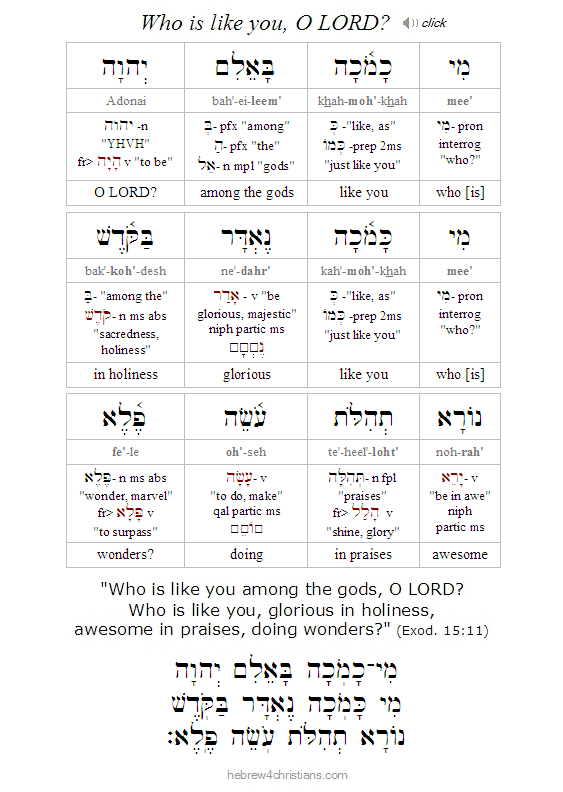 |
This week's Torah:
Parashat Beshalach - בשלח
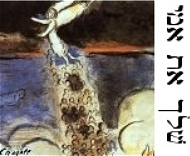
In our Torah portion this week, the Lord divided the waters of the sea to make a path for the Israelites, a miracle that symbolized newness of life as God's liberated people...
02.02.25 (Shevat 4, 5785) Recall that last week's Torah portion (i.e., parashat Bo) told how the Israelites were finally released from Egypt after God issued the final plague during the time of Passover. In this week's portion (parashat Beshalach: Exod. 13:17-17:16), the Israelites begin their journey home, after 430 years of troubled exile. Instead of leading them along a direct route to the Promised Land, however, God directed them south, toward the desert, where the Glory of God appeared as a Pillar of Cloud by day and as a Pillar of Fire by night to lead them on their way. When Pharaoh heard that the Israelites were at the border of the desert, however, he perversely decided to pursue them and bring them back to Egypt. God then redirected the Israelites to camp near the edge of the Sea of Reeds, where the Egyptian army finally caught up with them. Dramatically, the Israelites were caught between the sea on one side, and Pharaoh's formidable army on the other!
The terrified people then began to blame Moses for their predicament. Moses reassured them of God's final deliverance and raised his staff to miraculously divide the waters of the sea. All that night the Shekhinah Glory enshrouded the Egyptian army but gave light to Israel as the people crossed through the sea on dry ground. Just before dawn, the dark pillar of cloud that veiled the Egyptian army lifted, and the soldiers immediately rushed after the Israelites into pathway of the sea. God then told Moses to lift his staff again so that the waters would overwhelm the Egyptians with their chariots and horsemen. By the time dawn arrived, the Israelites saw the dead bodies of Pharaoh's army lining the seashore.
Moses and Miriam then led the people of Israel in a spontaneous hymn of thanks and praise to God for their complete deliverance from Pharaoh, which is often called the "Song of the Sea" (i.e., shirah hayam). The song begins, "The Lord is my strength and song, and he is become my salvation" / עָזִּי וְזִמְרָת יָהּ וַיְהִי־לִי לִישׁוּעָה (Exod. 15:2, cp. Isa. 12:2). For Orthodox Jews, singing Shirat Hayam every day is thought to fulfill the biblical commandment to "remember the day of your departure from the land of Egypt as long as you live" (Deut. 16:3). Note that Shirat Hayam is also sung on the 7th day of Passover, as a memorial of the deliverance by God through the waters of the Sea of Reeds.
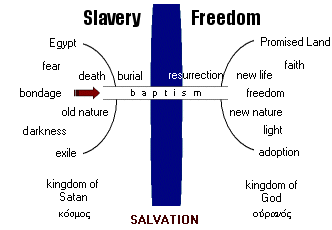 |
The great message of our deliverance resounds throughout Jewish history, and indeed it is regarded as a theme of the faithful love of LORD for His people:
Hebrew Lesson
Isaiah 12:2 Hebrew reading (click):
After the jubilation for their deliverance, the narrative resumes as God led the Israelites away from the sea, into the desert of Sin (מִדְבַּר־סִין), a desolate region about midway to Mount Sinai. Instead of taking the people along a direct route to the promised land, however, the Lord led them directly to the "school" of the desert. After traveling three days without finding any water, however, the people complained and God provided them with fresh water at Marah. Awhile later, the matzah (unleavened bread) the people had brought with them ran out and God tested their obedience by giving them "bread from heaven" (i.e., manna). The portion ends with the Amalekites' surprise attack of Israel at Rephidim, near Mount Sinai, and the selection of Joshua as the leader of the army of Israel.
<< Return
|
|















